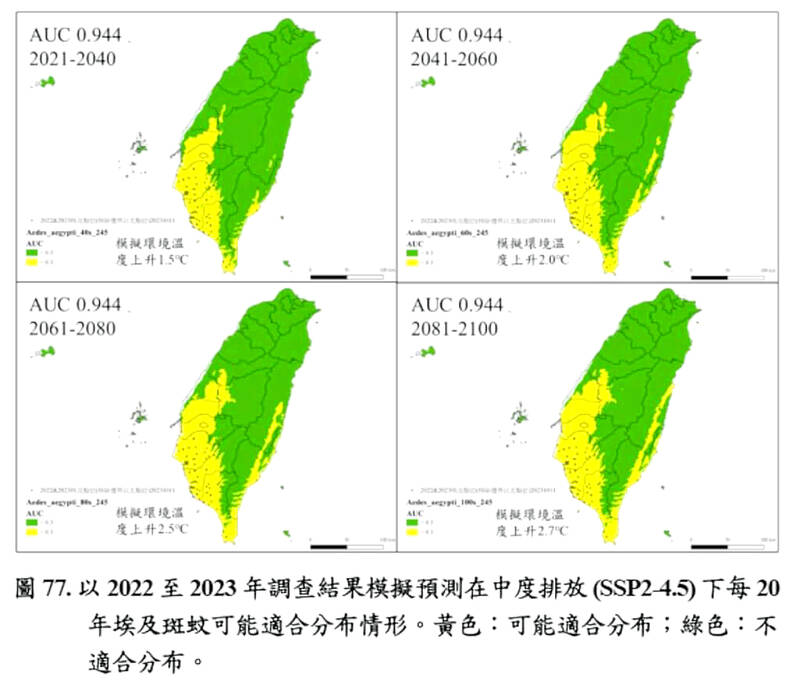Mosquitoes carrying the dengue virus are not venturing northward despite isolated sightings as far as New Taipei City, but they are expanding their range to higher altitudes, a study commissioned by the Ministry of Environment found yesterday.
The ministry commissioned the National Health Research Institutes to report on the distribution of dengue fever vectors in response to the UN’s Intergovernmental Panel on Climate Change prediction that harmful arthropods are expanding to higher altitudes.
The report aims to provide a solid, systematic and science-based foundation for the government to reference when drafting policies to control dengue vectors, the ministry said.

Photo courtesy of the Ministry of Environment via CNA
The distribution of the Aedes aegypti, or yellow fever mosquito, which spreads dengue fever and several other illnesses, remained around the same in regions south of Chiayi County’s Budai Township (布袋), Huang Ching-chi (黃旌集), project convener and a researcher at the National Mosquito-borne Diseases Control Research Center, told reporters.
From field studies, the center discovered one yellow fever mosquito in Yunlin County’s Beigang Township (北港) and one in New Taipei City’s Banciao Railway Station in 2022.
Last year, it captured one yellow fever mosquito each in Chiayi County’s Jhongpu Township (中埔) and Taichung’s Sinwurih (新烏日) railway station. As for the Asian tiger mosquito, Huang said it has shown signs of expanding to regions higher than 1,500m.
Studies between 2009 and 2011 showed isolated incidents of Asian tiger mosquitoes in areas 1,700m above sea level, but this year’s study showed a general expansion of the mosquito population in places higher than 1,500m, he said.
However, with fewer population centers in mountainous regions, the presence of Asian tiger mosquitoes should not contribute to increased dengue outbreaks, the study said.
Huang said that spare tires, empty barrels and buckets, junked bathtubs, urns, pots and pans, which are often used as makeshift flower pots, are also possible sites for carrier mosquitoes to lay eggs.
Yellow fever and Asian tiger mosquitoes found in high-altitude areas often hatch from water in spare tires, he said.
The eggs of disease-carrying mosquitoes are known to last for up to half a year in dry conditions and hatch when next exposed to water, Huang said, urging people to clean out tires when possible and to remember to puncture holes in them to drain out water.
If climate change causes temperatures to rise by 1.5oC by 2040, yellow fever mosquitoes could range as far north as Hualien County’s Rueisui Township (瑞穗) in the east and Taichung’s Taiping District (太平) in the west, the study showed.
If temperatures rise 2oC by 2060, the mosquitoes are expected to expand to Hualien City in the east and Taichung’s Beitun District (北屯) in the west, it said.
A 2.5oC increase by 2080 would see the mosquitoes extend their range further north to Taichung’s Tanzih District (潭子) in the west, it said.

An undersea cable to Penghu County has been severed, the Ministry of Digital Affairs said today, with a Chinese-funded ship suspected of being responsible. It comes just a month after a Chinese ship was suspected of severing an undersea cable north of Keelung Harbor. The National Communications and Cyber Security Center received a report at 3:03am today from Chunghwa Telecom that the No. 3 cable from Taiwan to Penghu was severed 14.7km off the coast of Tainan, the Ministry of Digital Affairs said. The Coast Guard Administration (CGA) upon receiving a report from Chunghwa Telecom began to monitor the Togolese-flagged Hong Tai (宏泰)

A cat named Mikan (蜜柑) has brought in revenue of more than NT$10 million (US$305,390) for the Kaohsiung MRT last year. Mikan, born on April 4, 2020, was a stray cat before being adopted by personnel of Kaohsiung MRT’s Ciaotou Sugar Refinery Station. Mikan was named after a Japanese term for mandarin orange due to his color and because he looks like an orange when curled up. He was named “station master” of Ciaotou Sugar Refinery Station in September 2020, and has since become famous. With Kaohsiung MRT’s branding, along with the release of a set of cultural and creative products, station master Mikan

RISING TOURISM: A survey showed that tourist visits increased by 35 percent last year, while newly created attractions contributed almost half of the growth Changhua County’s Lukang Old Street (鹿港老街) and its surrounding historical area clinched first place among Taiwan’s most successful tourist attractions last year, while no location in eastern Taiwan achieved a spot in the top 20 list, the Tourism Administration said. The listing was created by the Tourism Administration’s Forward-looking Tourism Policy Research office. Last year, the Lukang Old Street and its surrounding area had 17.3 million visitors, more than the 16 million visitors for the Wenhua Road Night Market (文化路夜市) in Chiayi City and 14.5 million visitors at Tainan’s Anping (安平) historical area, it said. The Taipei 101 skyscraper and its environs —

Actor Lee Wei (李威) was released on bail on Monday after being named as a suspect in the death of a woman whose body was found in the meeting place of a Buddhist group in Taipei’s Daan District (大安) last year, prosecutors said. Lee, 44, was released on NT$300,000 (US$9,148) bail, while his wife, surnamed Chien (簡), was released on NT$150,000 bail after both were summoned to give statements regarding the woman’s death. The home of Lee, who has retreated from the entertainment business in the past few years, was also searched by prosecutors and police earlier on Monday. Lee was questioned three